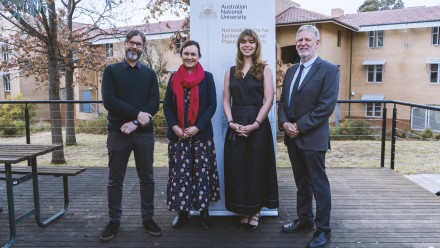Development of the Uni Virtual Clinic
Who developed the UVC?

The original Uni Virtual Clinic project began in 2012 and was led by a team of researchers at the Centre for Mental Health Research at the Australian National University; the same research centre that developed innovative online mental health programs like MoodGym, eCouch, and BluePages.
Many developers, researchers, and students built the content and web infrastructure for the original Uni Virtual Clinic, which has since been decommissioned and reworked into the current version of the program, UVC-Lite.
The current UVC-Lite team involves passionate research experts in youth mental health, suicide prevention, university student mental health, and e-health. This team re-engineered and animated the content from the original Uni Virtual Clinic into 12 video-based modules.
|
Dr Lou Farrer, Senior Research Fellow |
Dr Lou Farrer, a Senior Research Fellow at the Centre for Mental Health Research, ANU, is the Chief Investigator and champion of the Uni Virtual Clinic since its inception in 2012. Dr Farrer utilises her expertise as a psychologist, ANU student counsellor, and e-health researcher to inform the ongoing development and evaluation of the UVC program. |
|
Dr Amelia Gulliver, Research Fellow |
Dr Amelia Gulliver is a Research Fellow at the Centre for Mental Health Research, ANU, and has also worked on the UVC since 2012. Amelia is a passionate advocate, researcher, and main contributor to the Uni Virtual Clinic, alongside Dr Lou Farrer. Amelia led the Uni Virtual Clinic project during 2016 and brings her wealth of experience in student mental health, e-health, and consumer and carer research to the project. |
|
Natasha Katruss, Research Assistant |
Natasha Katruss is a Research Assistant who joined the Centre for Mental Health Research and the original UVC team in 2015, assisting with the content and web development of the original UVC program, and the management of the first UVC evaluation trial in 2017. Since then, Natasha has continued assisting the project, lending her expertise in Information Technology to undertake the IT development, technological support, and video animation of the UVC-Lite. |
|
Professor Philip Batterham |
Researcher profile |
|
Professor Alison Calear |
Researcher profile |
|
Dr Liana Leach |
Researcher profile |
|
Professor Penelope Hasking |
Researcher profile |
How was the UVC developed?
The UVC was developed through multiple interlinked participatory research and development stages in consultation with young people, university stakeholders, and other service providers.
An initial scoping stage was undertaken to inform the development of a service model for the UVC within a university setting. This stage comprised three systematic reviews[1,2,3], two surveys (one with university staff[4,5], one with university students[6]), and four focus groups (with university students)[7,8,9]. Each method in this stage was designed to capture a different component to inform the development of the UVC.
The second stage of the development of the UVC involved the development of a prototype of the UVC (based on the research conducted in Stage 1), and iterative cycles user testing and redevelopment. The prototype was tested with a group of students, and their feedback was used to re-develop the existing prototype, which was then subjected to further student input during the next prototype session.

Figure 1. Wireframe of the uni virtual clinic

Figure 2. First prototype of the uni virtual clinic

Figure 3. Second prototype of the uni virtual clinic

Figure 4. Final look and feel of the uni virtual clinic
Stage 3 involved software implementation, which was undertaken by an in-house technical staff team within the ANU, and was managed by senior staff with extensive multi-disciplinary experience in e-health intervention research. A Student Leadership group of ANU students was also involved in providing input into the design of the UVC at this stage.
The UVC was launched in 2016 and tested in a randomised controlled trial with ANU students in 2017-2018.
A timeline of the Uni Virtual Clinic
| 2011 | Researchers from CMHR were awarded a Young and Well Cooperative Research Centre grant to conduct a multi-year research project to develop an online mental health platform and service for university students, using a participatory design approach. |
| 2012 to 2016 | The iterative participatory design and development process of the UVC takes place, involving numerous research studies, stakeholder engagement, and the development of a Student Leadership Group. Various prototypes of the UVC are tested with students; redesigned and redeveloped until a final version is developed for launch in 2016. |
| February 2016 |
Development of the Uni Virtual Clinic is completed. The team soft-launches the platform to the ANU student community at ANU’s O-Week in Semester 1 of 2016.
|
| 2017 to 2018 | Dr Lou Farrer and team receive a project grant to conduct a pilot randomised controlled trial of the Uni Virtual Clinic with ANU students. Funding for this project was provided by an Early Career Researcher Award from the Society for Mental Health Research (SMHR) and the Australian Foundation for Mental Health Research (AFFIRM). The trial takes place between 2017 and 2018. |
| August 2019 |
The results of the UVC pilot trial are published in the journal of Internet Interventions. |
| 2019 to 2021 |
Dr Lou Farrer and team receive an Australian Rotary Health Grant to evaluate the UVC in a national sample of university students. UVC content is redeveloped into the UVC-Lite program, a series of 12 brief, video-based modules, containing key information and strategies from the original UVC platform. |
| 2021 to 2023 | Recruitment starts for the national trial of UVC-Lite. The trial will continue into 2022, and results will be published in 2023. |













